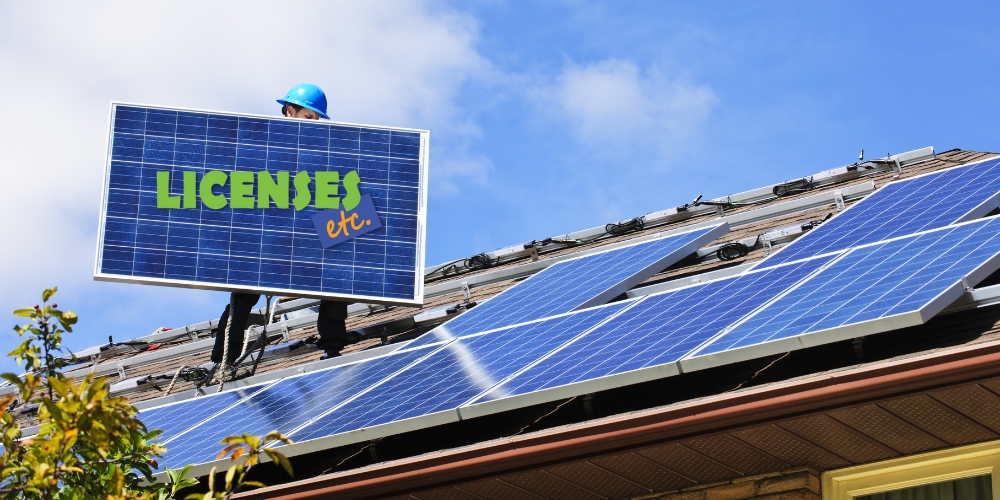- June 27, 2024
- Posted by: admin
- Category: Florida Solar Contractor License

Starting a Florida solar panel contracting business or venturing into solar energy as a homeowner can be both exciting and rewarding. With the growing demand for renewable energy, this industry offers immense potential. This blog will delve into the various aspects of a Florida solar panel contracting business—from the types of solar panels available to homeowners, the installation process, project timelines, pricing, profit potential, and risks involved.
Types of Solar Panels for Homeowners
Monocrystalline Solar Panels
Monocrystalline panels are known for their high efficiency and sleek appearance. Made from single-crystal silicon, these panels have a longer lifespan and perform better in low-light conditions. They are relatively expensive but offer the best return on investment.
Polycrystalline Solar Panels
Polycrystalline panels are made from multiple silicon crystals melted together. They are less efficient than monocrystalline panels but are more affordable. They are a popular choice for homeowners looking for a balance between cost and efficiency.
Thin-Film Solar Panels
Thin-film panels are made from various materials, including cadmium telluride and amorphous silicon. They are lightweight, flexible, and easier to install. However, they have lower efficiency rates and may not be the best choice for homes with limited roof space.
The Installation Process
Site Assessment and Design
The first step in any solar installation is a comprehensive site assessment. This involves evaluating the roof’s condition, its orientation, and any shading issues. Based on this assessment, a custom design is created to maximize energy production.
Permitting and Approvals
Obtaining the necessary permits and approvals from local authorities is crucial. This step ensures that the installation complies with all zoning laws, building codes, and safety regulations.
Electrical Wiring
Once the design is approved, the installation begins with electrical wiring. This involves connecting the panels to an inverter, which converts the DC electricity generated by the panels into AC electricity for home use.
Mounting the Panels
Solar panels are then mounted on the roof or a ground-mounted structure. This step requires careful alignment and secure fastening to withstand various weather conditions.
Battery Installation
For homeowners opting for energy storage, battery installation is the next step. Batteries store excess energy produced during the day for use at night or during power outages.
System Testing
Finally, the entire system is tested to ensure it operates efficiently and safely. This includes checking all electrical connections, verifying the inverter’s performance, and ensuring the monitoring system is functioning correctly.
Project Timelines
The duration of a solar installation project can vary depending on the complexity and size of the system. On average, a residential solar installation can take anywhere from 1 to 3 months, including the time required for permitting and approvals.
Pricing and Profit Potential
General Pricing
The cost of solar panel installation varies based on the type of panels used, the system’s size, and any additional features like battery storage. On average, homeowners can expect to pay between $15,000 and $25,000 for a complete solar system. This cost includes the panels, inverter, mounting hardware, labor, and permits. Of course this is a rough estimate based on industry averages.
Profit Potential
For contractors, the profit potential in the solar industry is substantial. With the growing demand for renewable energy and various government incentives, contractors can expect high returns on investment. Properly managed projects can yield profit margins of 10% to 20%.
Risks and Construction Defects to Avoid
Common Risks
- Poor Quality Components: Using substandard panels or inverters can lead to system failures and reduced efficiency.
- Inadequate Design: Incorrect system design can result in shading issues, reduced energy production, and increased costs.
- Improper Installation: Faulty wiring or insecure mounting can cause safety hazards and damage to the property.
Construction Defects to Avoid
- Roof Leaks: Improper sealing around mounts and penetrations can lead to roof leaks and water damage.
- Electrical Hazards: Poor electrical work can create fire risks and other safety issues.
- Battery Malfunctions: Incorrect installation of batteries can lead to performance issues and reduced lifespan.
Considering Getting A Florida Solar Panel Contractor License?
Venturing into the solar panel contracting business or installing solar panels as a homeowner involves several critical steps and considerations. From choosing the right type of solar panels to understanding the installation process, pricing, and potential risks, being well-informed is key to a successful project. With careful planning and execution, both contractors and homeowners can reap the benefits of renewable energy while contributing to a sustainable future.
Becoming a Florida solar panel contractor is a great opportunity. With the right qualifications, experience, and business acumen, you can play a part in shaping Florida’s infrastructure while running a successful business. The journey may be challenging, but the rewards are well worth it.
If you looking to get your Florida Solar Panel Contractor’s License or before making a decision on which license to pursue in general regarding your business, our team of licensing experts will guide you every step of the way. We make the process easy to apply for your Florida Contractor License! We fill out everything for you! Ninety-five percent of our applicants get through the process the first time with no issues. We also can help guide you in how to start up your LLC along with providing your credit reports and guidance to many 3rd party partners that can help you such as website creation, online marketing to other specific business services.
To start the process, call us at 239-777-1028 and schedule your FREE consultation today.
